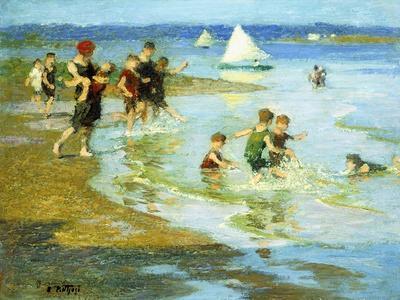Note: If you wish to receive, via e-mail, (1) my weekly newsletter or (2) daily copies of these posts, write to me at rrbates1951@gmail.com. Comments may also be sent to this address. I promise not to share your e-mail with anyone. To unsubscribe, write here as well.
Wednesday
We’re currently at North Myrtle Beach with my two sons, their wives, and their five children. A William Meredith beach poem, therefore, is perfect for the occasion. Familiar as he is with New England winters, Meredith feels impelled to contrast the sand with snow and notes, in winter, “the mind is in charge of things.” In the summer, by contrast, nature appears to take over:
He tries to remember snow, his season.
The mind is in charge of things then.
Summer is for animals, the ocean is erotic,
all that openness and swaying.
As he lies in the sun on the beach, the still mindful speaker notes, at first, that the Yale-educated nanny (or babysitter) uses grammatically incorrect language as she addresses her charges:
Why doesn’t the girl who takes care
of the children, a Yale girl without flaw,
know the difference between lay and lie?
By the end of the poem, however, he has surrendered to nature and given up the need to exert any kind of control, including grammatical control:
It is just as well, [the children] have all been changed
into small shrill marginal animals,
he would not want to understand them again
until after Labor Day. He just lays there.
Here’s the poem:
Rhode Island
By William Merideth
Here at the seashore they use the clouds over & over
again, like the rented animals in Aïda.
In the late morning the land breeze
turns and now the extras are driving
all the white elephants the other way.
What language are the children shouting in?
He is lying on the beach listening.
The sand knocks like glass, struck by bare heels.
He tries to remember snow noise.
Would powder snow ping like that?
But you don’t lie with your ear to powder snow.
Why doesn’t the girl who takes care
of the children, a Yale girl without flaw,
know the difference between lay and lie?
He tries to remember snow, his season.
The mind is in charge of things then.
Summer is for animals, the ocean is erotic,
all that openness and swaying.
No matter how often you make love
in August you’re always aware of genitalia,
your own and the half-naked others’.
Even with the gracefulest bathers
you’re aware of their kinship with porpoises,
mammals disporting themselves in a blue element,
smelling slightly of fish. Porpoise Hazard
watches himself awhile, like a blue movie.
In the other hemisphere now people
are standing up, at work at their easels.
There they think about love at night
when they take off their serious clothes
and go to bed sandlessly, under blankets.
Today the children, his own among them,
are apparently shouting fluently in Portuguese,
using the colonial dialect of Brazil.
It is just as well, they have all been changed
into small shrill marginal animals,
he would not want to understand them again
until after Labor Day. He just lays there.
There will be time—after Labor Day—to return to our easels. For the moment, just go with the flow. And since understanding is no longer a priority, the children can speak any language they choose.


